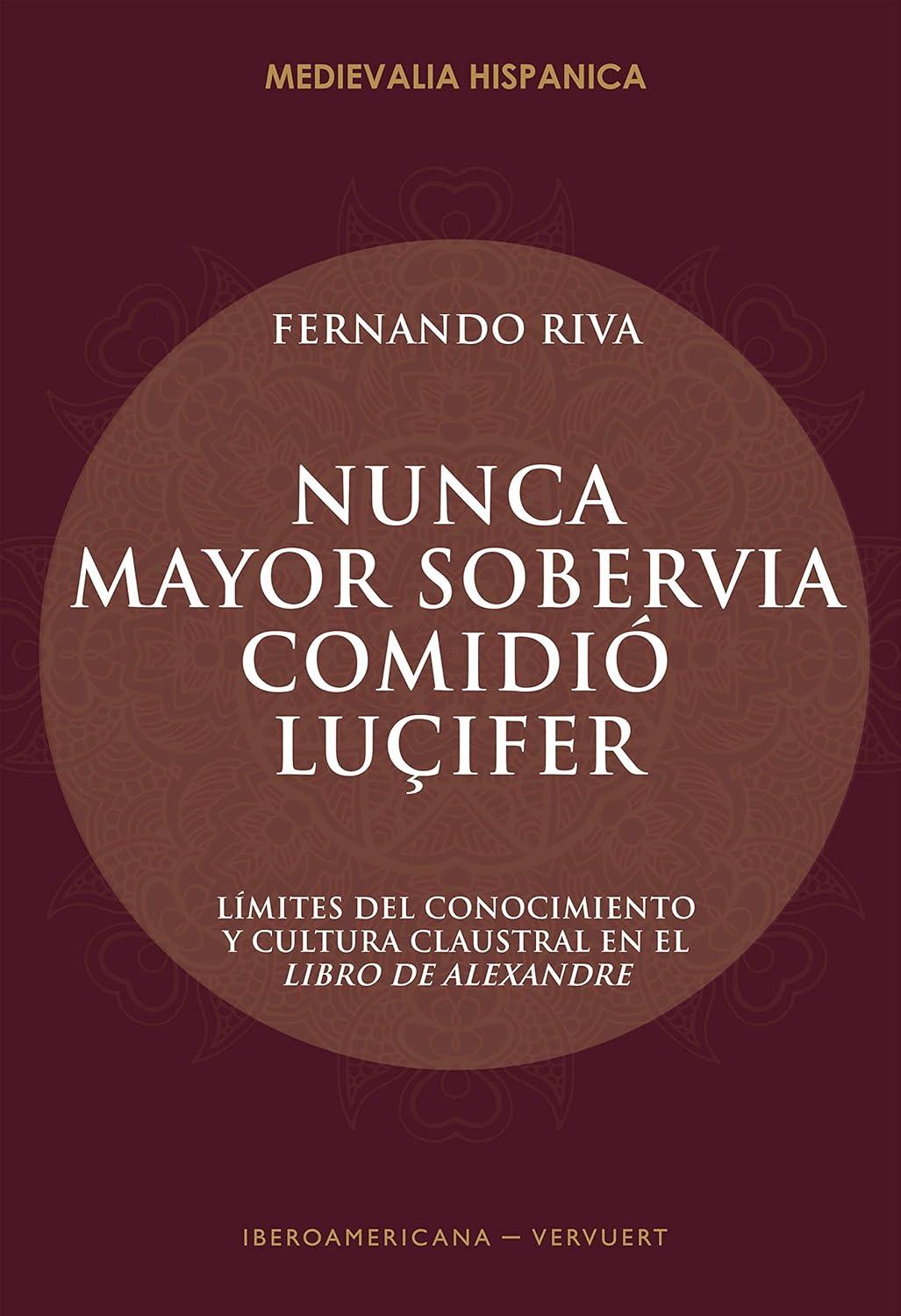
Fernando Riva

New Cabell Hall 439
Education
PhD, Yale (2017)
Research Summary
My research investigates the process of appropriation and absorption of Arabic and Jewish knowledge in vernacular Iberian literatures in the Middle Ages. This process of appropriation and absorption has two distinct aspects. The first type appears as a tense reaction against the social and intellectual changes of the twelve and thirteenth centuries as portrayed in several cuaderna vía poems. The second type emerges as a conscious reinterpretation that seeks to support an imperial project such as that of King Alfonso the Wise. My first book, published in May of 2019 in Spain, which has been reviewed in top-tier international journals, concerns the first type of appropriation and absorption: it analyzes the concept of knowledge in the thirteenth-century Spanish work known as Libro de Alexandre (c. 1220-1235), where I study the role played by intellectual curiosity and its relation with the deep cultural changes that began in the twelfth century throughout the Mediterranean. My current research project is derived from my first book. It deals with the second type of appropriation and absorption, i.e., the fruitful reinterpretation of magic, astrology, natural philosophy, the discourse of secrets, and their relation to a political project in the medieval Iberian Peninsula. As part of a solid continuity in my research, this second book will complement the first one and attempt to offer a whole analysis of the literary and cultural phenomena in thirteenth-century Christian Iberia. These dynamics of appropriation, in turn, will lay the foundation for the Renaissance and the Early Modern Period. In that sense, my research is relevant to debates on medieval intellectual history, religious studies, history of science, translation studies, and the growing field of Mediterranean studies.

Monographs
Reviewed in Bulletin of Spanish Studies 97.9 (2020) (Cossío); La corónica 49.1 (2020) (Giles); Speculum 96.3 (2021) (Pinet); Bulletin of Hispanic Studies 98.10 (2021) (Gerli); Mirabilia (2021-2022) (Cortijo Ocaña); Incipit 41 (2021) (Funes); Bulletin Hispanique (2021) (Navarro); Hispanófila 195 (2022) (Bower); Symposium 76.4 (2022) (Ancos); Revista Canadiense de Estudios Hispánicos 46.3 (2022) (Ogawa) ; Lexis 47.1 (2023) (Wiesse); Romanische Forschungen 135.2 (2023) (Savo).
Books of Secret Wisdom: The Development of Magic in the Iberian Peninsula (Castile and Aragon, 1106-1428) (expected, Spring 2026)
Editions
González de Clavijo, Ruy. Embajada a Tamorlán / Embassy to Tamerlane. Edited and Translated by E. Michael Gerli and Fernando Riva. Dumbarton Oaks Medieval Library, Harvard University Press (forthcoming).
Articles in peer-reviewed journals
- "Hagiografía femenina en Planeta (1218) de Diego García de Campos: santa Alpais de Cudot" (in progress).
- "Verificación y relato sobrenatural en Planeta (1218) de Diego García de Campos: el caso de la reclusa Gerois" (under review).
- "Escatología, interpretación bíblica y la conversión de los judíos en Planeta (1218) de Diego García de Campos" Journal of Medieval Iberian Studies (published online, Dec 15, 2025)
- "Los tiempos del Anticristo y Joaquín de Fiore en Planeta (1218) de Diego García de Campos". E-humanista 62 (2025), pp. 180-193
- "Discernimiento de espíritus y escatología en Planeta (1218) de Diego García de Campos". E-humanista 60 (2024), pp. 335-350.
- "Reclusión femenina, escatología y fenómenos sobrenaturales en Planeta de Diego García de Campos". Poéticas. Revista de Estudios Literarios 18, 2024, pp. 5-25.
- "Nigromancia ilusoria y ruptura del secreto en el Exemplo XI del Conde Lucanor". Zeitschrift für romanische Philologie 139.4 (2023): 1131-1160.
- “Ca con la uest antigua avié su cofradría: Some Demonological Aspects in Berceo’s “El Milagro de Teófilo”. Romanische Forschungen 134.4 (2022): 506-524.
- “Eschatological Afterlife and the Immortality of the Soul in Berceo’s ‘El prior y el sacristán’”. Zeitschrift für romanische Philologie 138.3 (2022): 709-739.
- “Demonic Jews and Christian Redemption in Berceo's ‘Milagro de Teófilo’”. Romance Quarterly 68.4 (2021): 240-256.
- “‘Cinco somos los qe aqí moramos’: Exorcism and Apocalyptic Piety in Berceo’s Vida de San Millán.” E-humanista 49 (2021): 333-350.
- ‘Est iste liber maximi secreti’: Alfonso X’s Liber Razielis and the Secrets of Kingship.” Neophilologus 104.4 (2020): 485-502.
- “De morte anime: Solomonic Magic in Alfonso X's Cantiga 125". Romance Notes 60.2 (2020): 253-263.
- “‘La carne es la tierra’: Microcosmic Adam, Cartographic Christ in the Libro de Alexandre”. Journal of Iberian Medieval 12.1 (2020): 44-69.
- “Los primeros profetas esto profetizaron: función de la cautividad babilónica y las profecías del fin en el Libro de Fernán Gonçález. Hispanic Review 87.4 (2019): 387-410.
- “El täu en las puertas de sagne del añel: la pascua apocalítiptica y el encierro de las diez tribus en el Libro de Alexandre”. La corónica 48.1 (2019):
- “Mas querìa ir perdersse o la uentura mudar: curiosidad intelectual y peregrinaje en el Libro de Apolonio”. La corónica 47.1 (2018): 29-50. Best Article vol. 47 (Fall 2018-Spring 2019). Awarded John K. Walsh Prize by the Executive Committee of the MLA Forum, LLC Medieval Iberian.
- “De obscura materia obscurament’ dictadas: interpretación y profecía en dos pasajes del Libro de Alexandre”. La corónica 46.2 (2018): 79-100.
- “Monarquía babilónica y soberbia luciferina en el Libro de Alexandre”. Bulletin of Hispanic Studies 95.10 (2018): 1031-51.
- “Sapiencialismo, espiritualidad claustral y heterodoxias en el Libro de Alexandre”. Bulletin of Spanish Studies 95.4 (2018): 187-217
- “La imagen ante los ojos: enfermedad de amor y castidad celeste en ‘La fuerza de la sangre’ de Miguel de Cervantes”. Bulletin of Hispanic Studies 93.2 (2016): 113-29.
- “San Jerónimo en el eje de la polémica en torno de la Carta Atenagórica de Sor Juana Inés de la Cruz”. Hispanic Review 82.1 (2014):1-20.
- “El último Garcilaso: la Égloga III y la incorporación de la literatura”. Boletín de la Academia Peruana de la Lengua 52 (2011): 139-57.
- "Vuestra vertud me vala, gloriosa, en mi exida: función del culto mariano e ideología de cruzada en el Poema de Mio Cid”. Lexis 35.2 (2011): 119-39.
- “Traductología renacentista y literalidad: un análisis paratextual de la traducción del Inca Garcilaso de la Vega de Los Diálogos de amor de León Hebreo”. Escritura y Pensamiento 18 (2006): 7-36